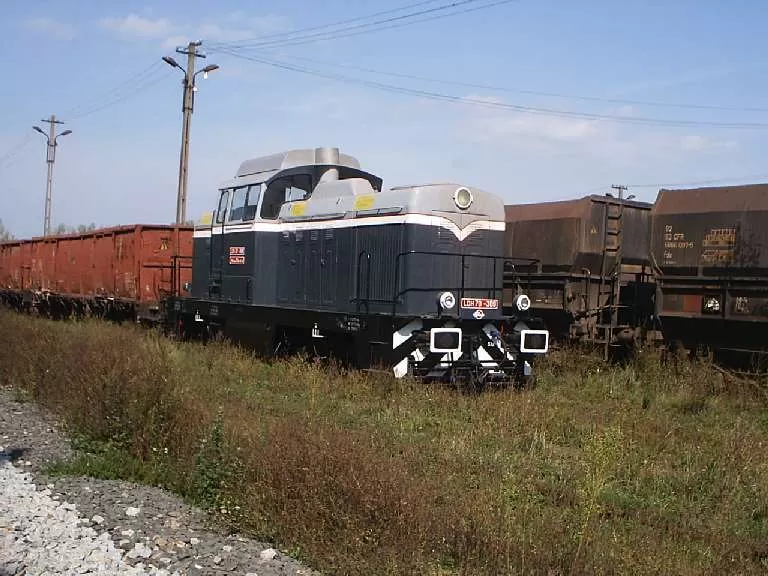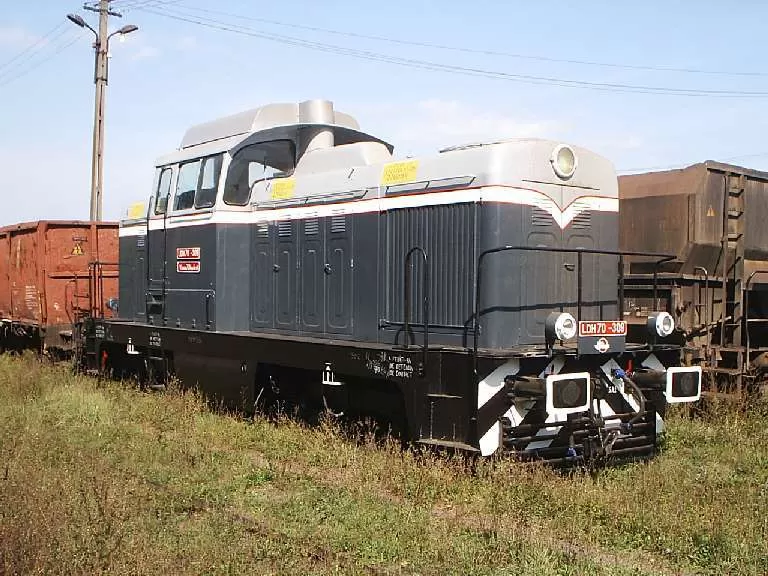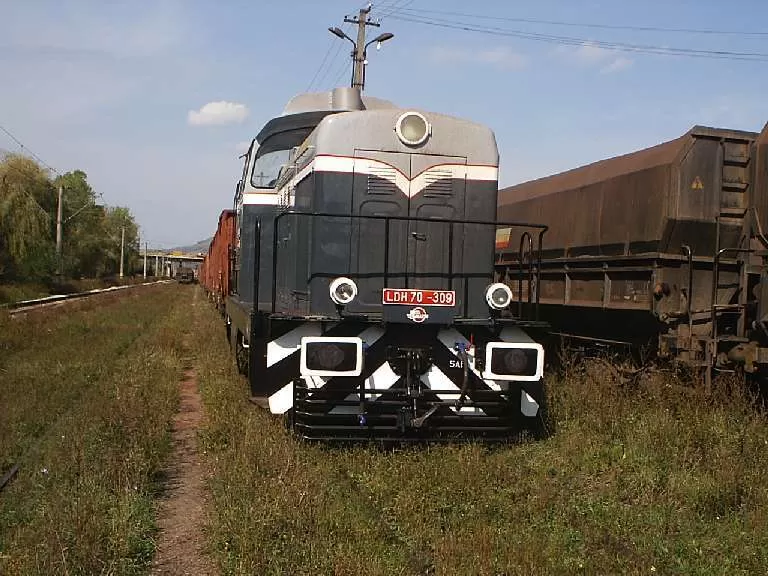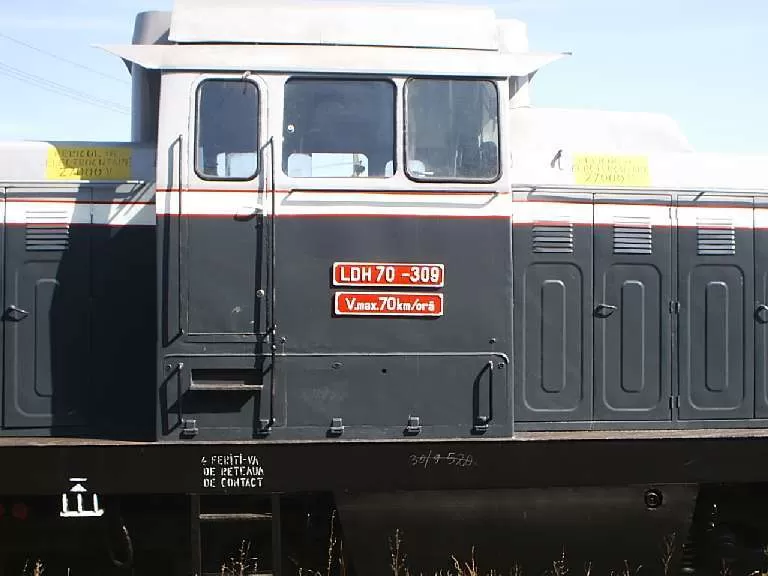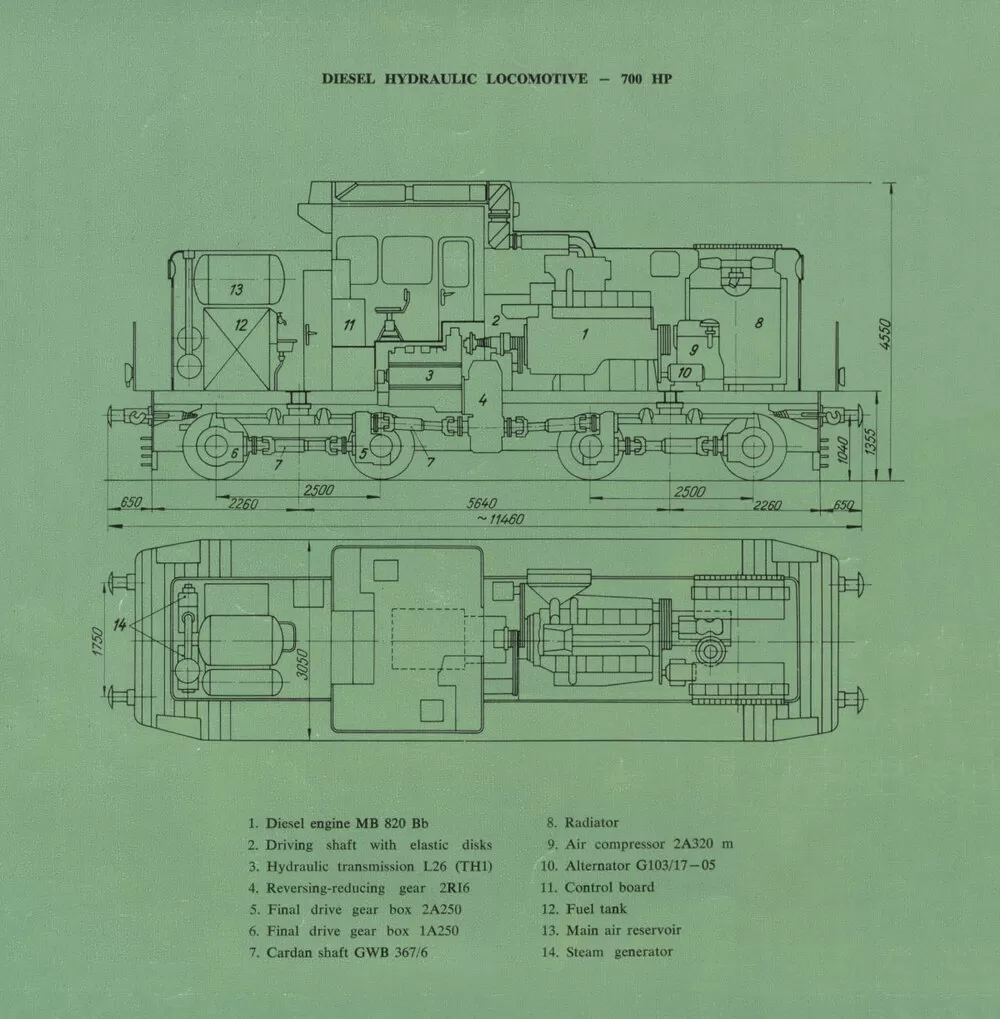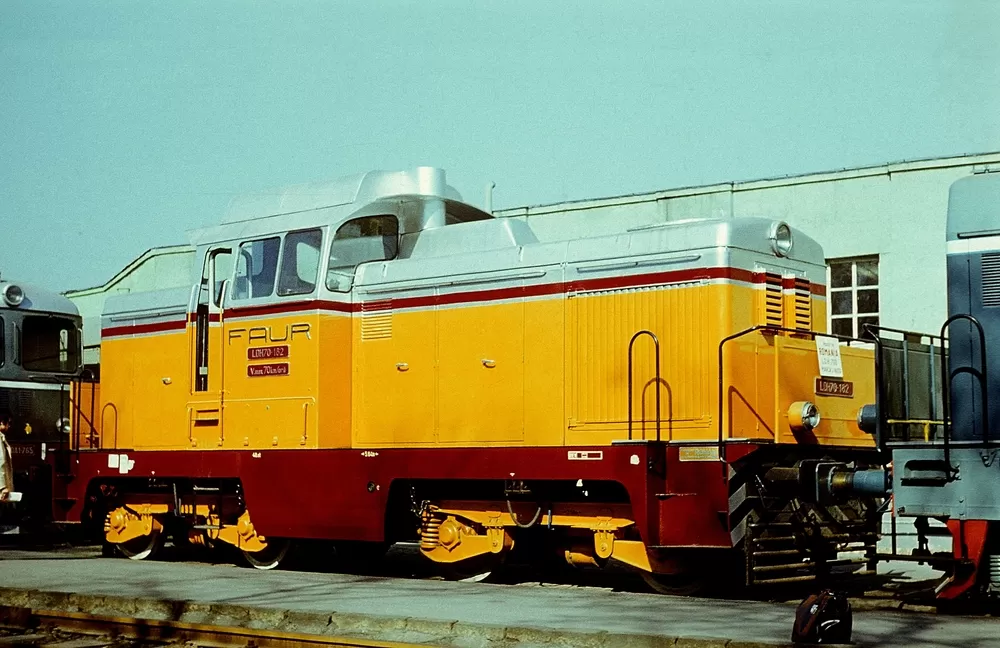
Source: P. Cvikevic - flickr.com
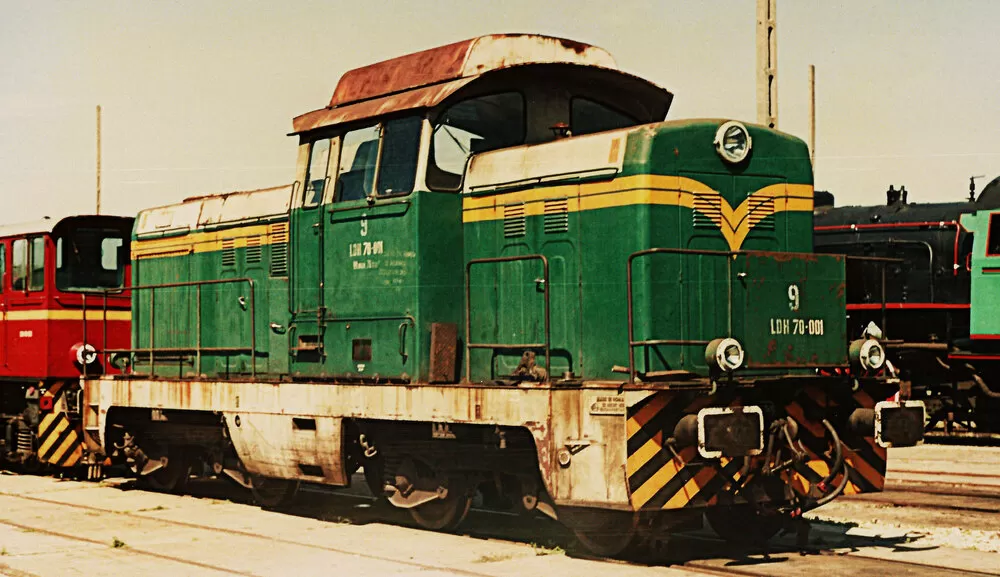
Source: Marcin Kapica - flickr.com
1967
[WORK IN PROGRESS - DATA IS BEEING COLLECTED]
In early 1960s Romanian works Uzinele 23 August (former Malaxa, now FAUR) developed a family of diesel locomotives with hydraulic transmission, both for line work and switching. They were designated LDH plus a number given approximately by rated power divided by ten. These locomotives, from LDH18 to LDH240, covered a very broad power range and were built in considerable numbers, both for Romanian operators (state railways CFR and industry) and for export. Some also had their narrow-gauge equivalents.
LDH70, intended mainly as a medium switcher, found widespread use, mainly in Romania but also abroad. Externally it was almost identical with LDH45 and LDH55, including dimensions, and differed mainly in prime mover – a 12-cylinder MB820Bb diesel, built on the Maybach licence, with a Brown-Boveri turbo-supercharger. Depending on engine version and settings, rated power ranged from 750 to 850 hp (552 to 626 kW). TH1A transmission gear was manufactured under Voith license.
First orders from CFR and industry came in 1965 and production continued for over twenty years. According to www.le-rail.ch (see References), total output was 993 examples. Romanian industrial enterprises received the majority of them, namely 808. CFR had 79 examples, classed 85 and used mainly for switching. These numbers include 96 examples fitted with 700 hp M836SR diesel engine, supplied between 1972 and 1980 and designated LDH70 SR. Probably all have already been withdrawn; a few still remain in use with minor private operators (two with Rompetrol Logistics). Second recipient were Hungarian state railways MÁV and private GySEV, which took delivery of 38 examples; some (seven?) were later sold to industry. They were classed M47.1 (later 2147); in February 2006 only ten of the original variant remained in service with MÁV. Some were re-engined with 855 hp MTU engines (class M47.12, later 2247); a number were additionally fitted with ballast to increase tractive effort (class M47.13, later 2347). In January 2008 these two modernized classes numbered 40 and 28, respectively, but some of these had been converted from very similar MÁV class 43 (LDH45). Other orders, although diverse, were smaller and included:
- Austria: 2 examples (industry);
- Czechoslovakia: 19 examples (class 748.4, all for industry);
- Egypt: 7 examples (industry);
- Greece: 19 examples (OSE class A.151, switching only, delivered in 1972, probably three or four still in use);
- Northern Korea: 11 examples (industry);
- Syria: 1 example (industry);
- Turkey: 6 examples (industry).
As data concerning industrial operators are scarce, it is difficult to estimate how many LDH70s are still in use, but certainly their number is not large.
Polish state railways PKP did not purchase these engines; indigenous 800 hp SM42 has been built in large numbers and experience with hydraulic transmission (used in SM15 and SM25) was rather discouraging. LDH70s were purchased only for industry, in small numbers – most probably, five examples in all. Little is known on their service. LDH70-001, used by the HSW steelworks, has been preserved and can now be seen at the Pyskowice loco heritage park. There are plans to restore this locomotive to working order. LDH70-003 and LDH70-004 were still in use in early 2000s, but have been withdrawn; on the remaining two examples I have no information. Three-digit service numbers might have been thought to indicate an intention to purchase these locomotives in much larger numbers. Most probably, however, they were assigned by the manufacturer.
Main technical data
No.
Parameter
Unit
Value
1.
Years of manufacture
-
1965 – 1988
2.
Total built / used in Poland
-
993 / 5
3.
Axle arrangement
-
B’B’
4.
Transmission type
-
hydraulic
5.
Design maximum speed
km/h
70 / 351)
6.
Prime mover type
-
MB820Bb
7.
Engine rating
kW/hp
514 / 700
8.
Bore X stroke
mmXmm
175 ´ 205
9.
Number of cylinders
-
12
10.
Number of electric engines
-
-
11.
Rated output of electric engines
kW
-
12.
Main reduction gear ratio
-
1.95 / 4.313)
13.
Diameter of drivers
mm
1 000
14.
Total weight
kg
48 000
15.
Axle load
T
12
16.
Axle base
mm
8 140
17.
Overall length
mm
11 460
18.
Maximum width
mm
3 050
19.
Train heating
-
-
20.
Brake type
-
Knorr / Oerlikon
From 1966 to 1988, FAUR built 993 LDH 70 diesel locomotives in Bucharest. 808 of these were destined for the Romanian industry. 79 of this locomotive type are delivered to the CFR for depot maneuvers. MAV and GySEV order 38 copies. The Greek State Railways ordered 19 machines in two lots. In between, smaller and smaller quantities are delivered abroad, 17 to the Czechoslovak industry, 11 to North Korea, 7 to Egypt, 6 to Turkey, 5 to the Polish industry, 2 to Austria and one to Syria. Together with the LDH 45, almost 1,500 locomotives with the same frame, bogies, driver's cab and bodies are supplied. The locomotives have hardly been technically changed by the manufacturer over the years. The first series had a sheet on the platforms,to prevent the shunting personnel from falling down. In order to save material, these were only produced as a tubular construction in newer series.
In early 1960s Romanian works Uzinele 23 August (former Malaxa, now FAUR) developed a family of diesel locomotives with hydraulic transmission, both for line work and switching. They were designated LDH plus a number given approximately by rated power divided by ten. These locomotives, from LDH18 to LDH240, covered a very broad power range and were built in considerable numbers, both for Romanian operators (state railways CFR and industry) and for export. Some also had their narrow-gauge equivalents.
LDH70, intended mainly as a medium switcher, found widespread use, mainly in Romania but also abroad. Externally it was almost identical with LDH45 and LDH55, including dimensions, and differed mainly in prime mover – a 12-cylinder MB820Bb diesel, built on the Maybach licence, with a Brown-Boveri turbo-supercharger. Depending on engine version and settings, rated power ranged from 750 to 850 hp (552 to 626 kW). TH1A transmission gear was manufactured under Voith license.
First orders from CFR and industry came in 1965 and production continued for over twenty years. According to www.le-rail.ch (see References), total output was 993 examples. Romanian industrial enterprises received the majority of them, namely 808. CFR had 79 examples, classed 85 and used mainly for switching. These numbers include 96 examples fitted with 700 hp M836SR diesel engine, supplied between 1972 and 1980 and designated LDH70 SR. Probably all have already been withdrawn; a few still remain in use with minor private operators (two with Rompetrol Logistics). Second recipient were Hungarian state railways MÁV and private GySEV, which took delivery of 38 examples; some (seven?) were later sold to industry. They were classed M47.1 (later 2147); in February 2006 only ten of the original variant remained in service with MÁV. Some were re-engined with 855 hp MTU engines (class M47.12, later 2247); a number were additionally fitted with ballast to increase tractive effort (class M47.13, later 2347). In January 2008 these two modernized classes numbered 40 and 28, respectively, but some of these had been converted from very similar MÁV class 43 (LDH45). Other orders, although diverse, were smaller and included:
- Austria: 2 examples (industry);
- Czechoslovakia: 19 examples (class 748.4, all for industry);
- Egypt: 7 examples (industry);
- Greece: 19 examples (OSE class A.151, switching only, delivered in 1972, probably three or four still in use);
- Northern Korea: 11 examples (industry);
- Syria: 1 example (industry);
- Turkey: 6 examples (industry).
As data concerning industrial operators are scarce, it is difficult to estimate how many LDH70s are still in use, but certainly their number is not large.
Polish state railways PKP did not purchase these engines; indigenous 800 hp SM42 has been built in large numbers and experience with hydraulic transmission (used in SM15 and SM25) was rather discouraging. LDH70s were purchased only for industry, in small numbers – most probably, five examples in all. Little is known on their service. LDH70-001, used by the HSW steelworks, has been preserved and can now be seen at the Pyskowice loco heritage park. There are plans to restore this locomotive to working order. LDH70-003 and LDH70-004 were still in use in early 2000s, but have been withdrawn; on the remaining two examples I have no information. Three-digit service numbers might have been thought to indicate an intention to purchase these locomotives in much larger numbers. Most probably, however, they were assigned by the manufacturer.
Main technical data
No.
Parameter
Unit
Value
1.
Years of manufacture
-
1965 – 1988
2.
Total built / used in Poland
-
993 / 5
3.
Axle arrangement
-
B’B’
4.
Transmission type
-
hydraulic
5.
Design maximum speed
km/h
70 / 351)
6.
Prime mover type
-
MB820Bb
7.
Engine rating
kW/hp
514 / 700
8.
Bore X stroke
mmXmm
175 ´ 205
9.
Number of cylinders
-
12
10.
Number of electric engines
-
-
11.
Rated output of electric engines
kW
-
12.
Main reduction gear ratio
-
1.95 / 4.313)
13.
Diameter of drivers
mm
1 000
14.
Total weight
kg
48 000
15.
Axle load
T
12
16.
Axle base
mm
8 140
17.
Overall length
mm
11 460
18.
Maximum width
mm
3 050
19.
Train heating
-
-
20.
Brake type
-
Knorr / Oerlikon
From 1966 to 1988, FAUR built 993 LDH 70 diesel locomotives in Bucharest. 808 of these were destined for the Romanian industry. 79 of this locomotive type are delivered to the CFR for depot maneuvers. MAV and GySEV order 38 copies. The Greek State Railways ordered 19 machines in two lots. In between, smaller and smaller quantities are delivered abroad, 17 to the Czechoslovak industry, 11 to North Korea, 7 to Egypt, 6 to Turkey, 5 to the Polish industry, 2 to Austria and one to Syria. Together with the LDH 45, almost 1,500 locomotives with the same frame, bogies, driver's cab and bodies are supplied. The locomotives have hardly been technically changed by the manufacturer over the years. The first series had a sheet on the platforms,to prevent the shunting personnel from falling down. In order to save material, these were only produced as a tubular construction in newer series.
Sources: http://www.locomotives.com.pl/Diesels/LDH70.htm, http://www.le-rail.ch/text/projekt86.htm, http://www.le-rail.ch/text/projekt86.htm
Do you have additional informations regarding this vehicle?
Help us writing the history of LDH70! Your knowledge is precious for us and the entire community, do not hesitate to share your facts, photos or videos:
Latest update on the 12th of July 2020 at 09:18
Contributor(s): Tudor C.
Discussion forum

